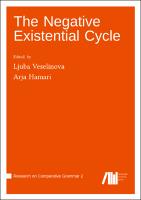The Negative Existential Cycle
Contributor(s)
Veselinova, Ljuba (editor)
Hamari, Arja (editor)
Collection
Knowledge Unlatched (KU)Language
EnglishAbstract
In 1991, William Croft suggested that negative existentials (typically lexical expressions that mean ‘not exist, not have’) are one possible source for negation markers and gave his hypothesis the name Negative Existential Cycle (NEC). It is a variationist model based on cross-linguistic data. For a good twenty years following its formulation, it was cited at face-value without ever having been tested by (historical)-comparative data. Over the last decade, Ljuba Veselinova has worked on testing the model in a comparative perspective, and this edited volume further expands on her work. The collection presented here features detailed studies of several language families such as Bantu, Chadic and Indo-European. A number of articles focus on the micro-variation and attested historical developments within smaller groups and clusters such as Arabic, Mandarin and Cantonese, and Nanaic. Finally, variation and historical developments in specific languages are discussed for Ancient Hebrew, Ancient Egyptian, Moksha-Mordvin (Uralic), Bashkir (Turkic), Kalmyk (Mongolic), three Pama-Nyungan languages, O’dam (Southern Uto-Aztecan) and Tacana (Takanan, Amazonian Bolivia). The book is concluded by two chapters devoted to modeling cyclical processes in language change from different theoretical perspectives. Key notions discussed throughout the book include affirmative and negative existential constructions, the expansion of the latter into verbal negation, and subsequently from more specific to more general markers of negation. Nominalizations as well as the uses of negative existentials as standalone negative answers figure among the most frequent pathways whereby negative existentials evolve as general negation markers. The operation of the Negative Existential Cycle appears partly genealogically conditioned, as the cycle is found to iterate regularly within some families but never starts in others, as is the case in Bantu. In addition, other special negation markers such as nominal negators are found to undergo similar processes, i.e. they expand into the verbal domain and thereby develop into more general negation markers. The book provides rich information on a specific path of the evolution of negation, on cyclical processes in language change, and it show-cases the historical-comparative method in a modern setting.
Keywords
Language Arts & Disciplines; LinguisticsDOI
10.5281/zenodo.6306474ISBN
9783985540358, 9783961103393, 9783961103393Publisher
Language Science PressPublisher website
https://langsci-press.org/Publication date and place
2022Grantor
Imprint
Language Science PressClassification
Linguistics


 Download
Download